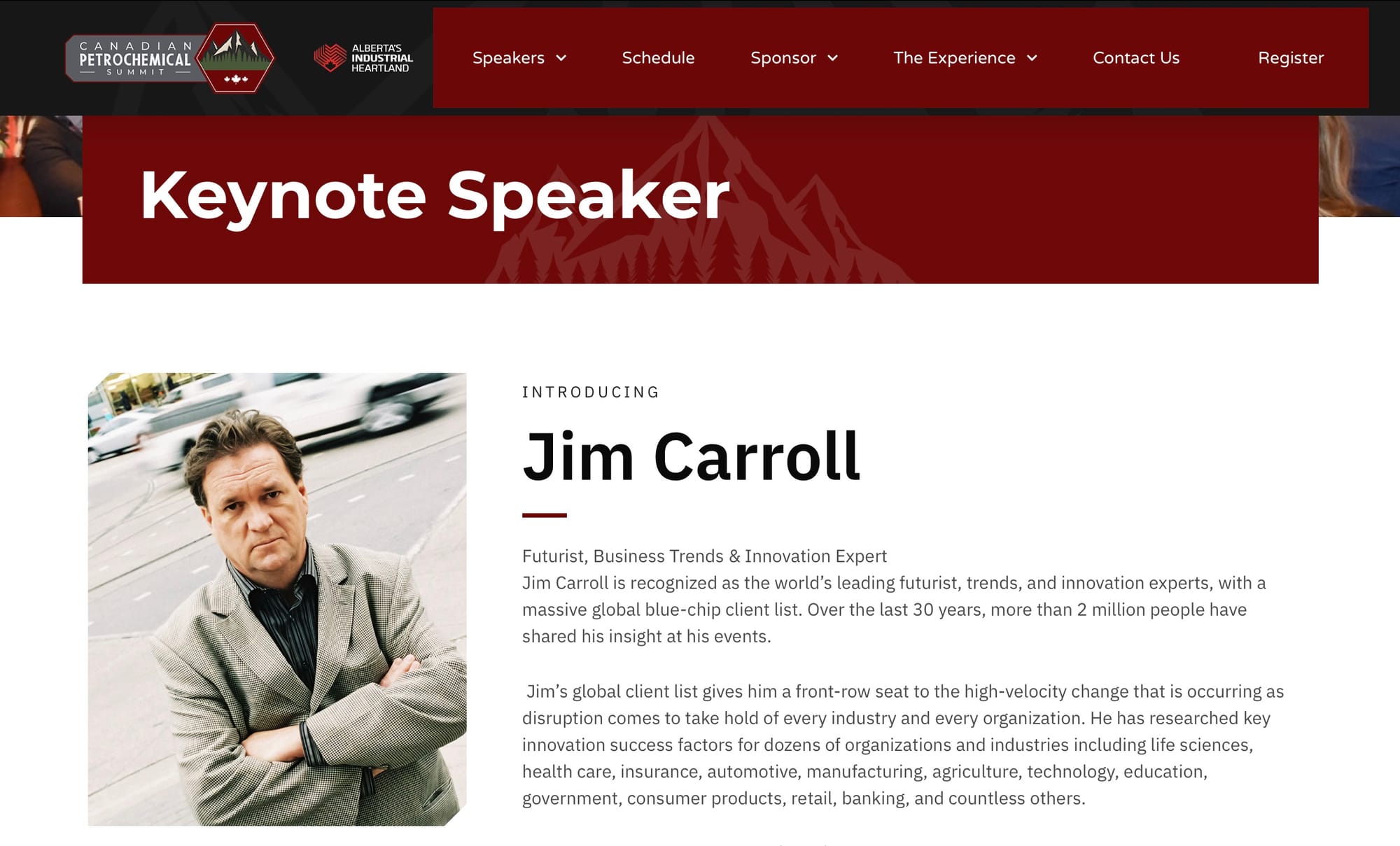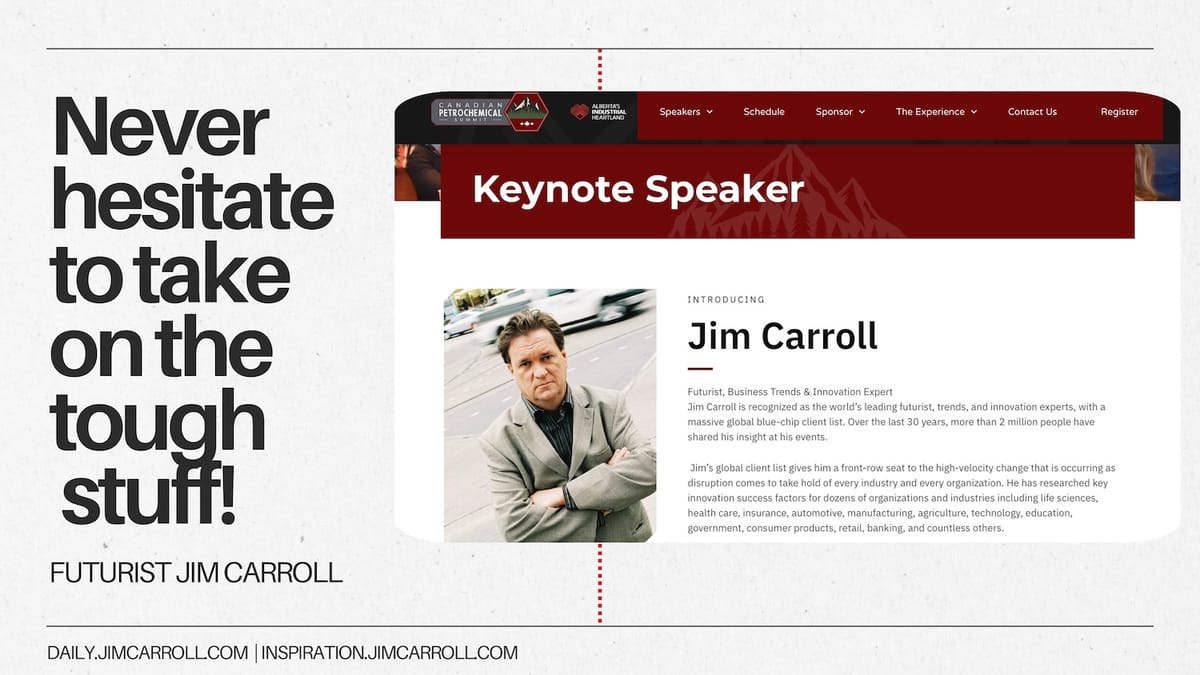"Never hesitate to take on the tough stuff!" - Futurist Jim Carroll
In some situations, people are eager to take on the message of change; in other cases, not so much.
That doesn't mean you should try to avoid the latter.
There are a. number of keynotes coming up from now through the fall of 2024, and each and every one is somewhere in my mind. I'm always thinking about them, the issues that will be on the table, and the challenge that the people in the room are facing. Subconciously, I'm constructing a path for each keynote, so that one day before the event, I can commit it to my slide deck.
With this thought process in play for every event, some keynotes are easy to pull together and commit to my slides; others, not so much! Case in point - this June, I will be headlining the Canadian Petrochemical Summit - the event details are here.

At the event, to be held out in Alberta, Canada, are executives from many of the major Canadian oil and petrochemical companies. It's no secret to anyone that the industry faces deep challenges. The product is essentially landlocked, with the Biden administration shutting down access to the US market through the keystone pipeline decision. There is little infrastructure to ship it outside of the country. Trends toward electric vehicles and renewables promise to put a significant dent in global demand. The politics surrounding the industry in Canada are raw, to say the least.
There is no doubt that there might be a degree of hostility around some of the trends of which I might speak; after all, I've shared blog posts such as The End of Oil, much of which is based on insight that I share on stage in many events, conferences and leadership meetings. That's not necessarily the type of story that these folks might want to get into. With that being the case, I will admit that the structure and content for this particular talk is a bit of a tough one to pull together. I've got to strike a careful balance between the opportunity story I can share while not shying away from some of the dramatic trends taking us forward.
I could have taken the easy way out, avoiding altogether a tough keynote situation like this - but I didn't. When thinking about it, I decided it could be a fascinating and complex voyage to take on from the stage - so why should I try to avoid the tough stuff?
What will inform my thinking for this talk? This older post below is very much on my mind, as are some of the others where I speak about economic development, future opportunity and big, bold industry bets.
All of these storylines involve big bets, big thinking, and big ideas - albeit, tough ones. And so why back away from the tough stuff, because that is a critical and necessary part of any future voyage.
The Amazing Math of Chemical Acceleration - And Why a Saudi Oil Giant is Realigning Its Business!
November 21, 2016 - Jim Carroll
Today, the Wall Street Journal ran an article,"Why Saudi Arabia’s Oil Giant Aims to Be Big in Chemicals, Too", with the subhead: "Aramco’s plans to vastly expand its petrochemical operations are part of the kingdom’s effort to remake its economy as oil’s future clouds."
"Aramco’s strategic goal is to create a global network of refining and petrochemical plants that let Saudi Arabia turn its biggest asset into hundreds of higher-value products crucial to modern life, from chewing gum to auto parts"
Why would one of the world's largest oil companies shift to a new focus on the chemical industry as their key opportunity? One reason is that the math, and hence the scope of the opportunity, is so overwhelming. (The other being that in a world awash in oil, energy is no longer a growth industry. So after the world gets flat, you put a ripple in it!)
Here's why: years ago, I dug out a fascinating observation having to do with the world of chemistry. I've used this in keynotes for BASF, the American Chemical Society, and many others. Consider the simple math at hand that spells opportunity with a capital 'O'.
- "...The number of known chemical substances has been growing exponentially since 1800, from some hundreds then to about 19 million today...."
- ".... the number constantly doubles every 13 years...."
- by 2025: 80 million chemical substances
- by 2050: 300 million
- and by 2100: 5 billion......
19 billion known chemical substances to 5 billion? That's a pretty exponential change....
Why is this important? I always point out on stage, when using these stats, that the discovery of a single new chemical substance led to the opportunity for Apple to miniaturize the hard drive -- that led to the first iPod.
Which was the birth of a multi-billion market.
For every new chemical substance, similar massive new opportunities exist.
That's what it means to live in an exponential world!
And that is what it means to focus on future opportunities through innovation.
Which is precisely what Said Aramco is focused on....
Futurist Jim Carroll drives an electric vehicle and has solar cells on the roof of his home.

